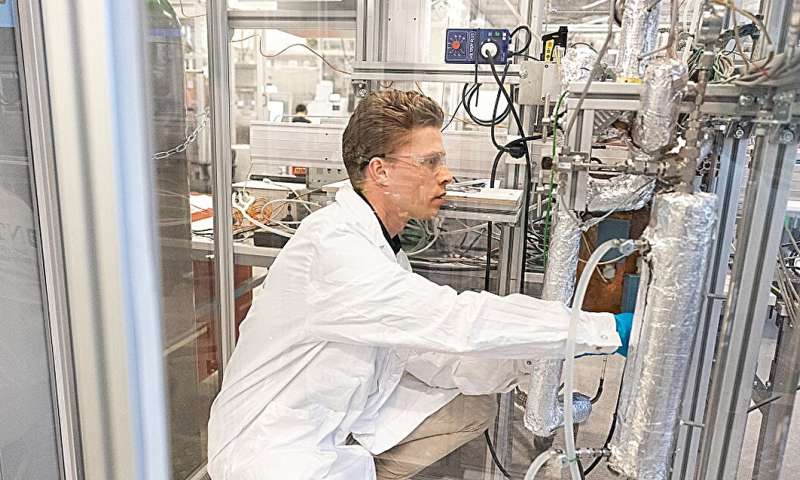Efficient aviation fuel from biomass: Your apple core may someday fuel an airplane

In the future, your apple core may end up fueling a Boeing. New research could help make the production of aviation fuel from biomass more efficient.
Aircraft will need carbon-based fuel for the foreseeable future. The fuel must have a high energy density otherwise it simply becomes too heavy to carry, at least on long-haul trips, and hydrogen and batteries are not efficient enough.
"But aviation fuel doesn't have to come from fossil-based oil. We can make it from renewable energy sources such as biomass," says Ask Lysne, a Ph.D. candidate at NTNU's Department of Chemical Engineering.
This biomass might be wood, offal from slaughterhouses or food waste from private households, to name a few examples.
The advantage of this type of fuel is that waste can be used that would otherwise have decomposed at a waste disposal site or in nature. In addition, the plants from which the biomass originates absorb CO2 as they grow.
A small proportion of aviation fuel in the world already comes from this type of biomass, but not enough. Yet.
Tar must be removed to get aviation fuel
Lysne has researched the production of fuel from biomass in connection with his doctoral work. He recently published several of his results in a research article where he and his colleagues present methods that could help make production of biomass fuel more efficient.
"To make aviation fuel, the biomass must react with either water vapor or oxygen at high temperatures, most often around 700°C to 900°C," explains Lysne.
This process breaks down the biomass into simple molecules such as hydrogen and carbon monoxide. These are the synthesis gases that you can then recombine into aviation fuel. Simple, right? Not really.
Usually, synthesis gases also contain impurities that you really don't want at all, such as tar.
"Tar can be removed by breaking it down at high temperatures, but a catalyst can also be used to accelerate decomposition under milder conditions," explains Lysne.
He has conducted research on precisely these types of catalysts that can purify the gases. His work enables the catalysts to last longer before being destroyed by the carbon compounds that are formed in the process.
New catalysts remove the tar
"I worked on developing catalysts that remove tar from synthesis gases through a process called steam reforming. These new catalysts are based on nickel and cobalt," Lysne said.
Using the catalyst, the tar substances react with water vapor. The tar then forms hydrogen and carbon monoxide, i.e., more of the synthesis gases. In other words, you get less of the tar you don't want, and more of the gases you do want.
"We produce the catalysts in the laboratory. We then characterize and test them in an experimental setup where we can study the effects of the catalysts' composition and factors such as tar composition, temperature and vapor concentration," says Lysne.
Previous catalysts have also used nickel.
"But by combining the active metals nickel and cobalt, we can increase the life of the catalyst compared with a traditional nickel catalyst," Lysne says.
This is because cobalt reduces the amount of destructive carbon compounds that form on the surface of the catalyst.
Important for future use
"The catalyst effectively removes the tar substances in the synthesis gas, producing a clean gas that is ready for further use," says Lysne.
The researchers identified critical temperature and tar concentration limits, which are important for catalyst performance and lifespan. The composition of the tar is also important because heavier tar components form highly deactivating carbon compounds in the catalyst.
These results may help improve the future production of aviation fuels from biomass using catalysts.
More information:
Effects of Ni-Co Ratio on Deactivation and Coke Formation in Steam Reforming of Hydrocarbon Impurities from Biomass Gasification with Ni-Co/Mg(Al)O Catalysts, Chemical Engineering Transactions (2022). DOI: 10.3303/CET2292007. www.cetjournal.it/cet/22/92/007.pdf
Provided by Norwegian University of Science and Technology